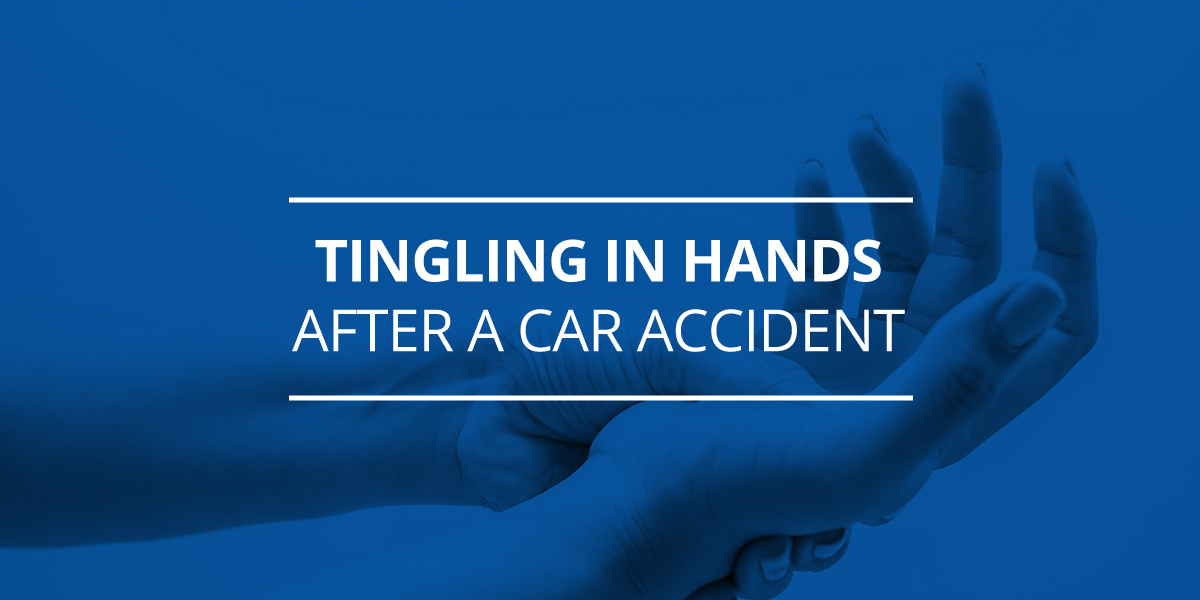Tingling in Hands After a Car Accident

What Does it Mean?
Tingling in the hands is a neurological symptom generally associated with pressure on your nerves. For example, if you cross your legs too long, when you uncross them you may get a numb, tingling, pins and needles sensation. Or when you sleep on your arm and you feel tingling when you move it.
These are the more common instances of tingling in the hands that people will experience regularly over the course of their lives. However, tingling in the hands can also be caused by trauma and injury as a result of nerve damage. This can be an indication of more serious damage to the nerves rather than merely pressure.
After an accident, it is important to look out for delayed signs such as mood swings, sleepiness, extreme tiredness, numbness in your limbs, tingling sensations or involuntary twitching. These can be warning signs that you may have nerve damage or herniated disc. Unfortunately, you may miss or ignore these signs that, if remain untreated, could cause severe complications in the long term.
Signs to Look Out For
- Pins and needles sensations
- Loss of feeling in limbs
- Involuntary muscle movements
- Radiating pain through the neck, back or shoulder
What Should You Do?
Initially, these signs may seem so insignificant that you just brush aside the tingling sensation as not connected to the accident. However, certain physical movements may become painful or even impossible to make. This can be something as easy as lifting your child or simple tasks such as typing on your keyboard.
It can become even more problematic if these symptoms impact your ability to perform your normal job duties, or if they lead you to self-medicate. It is important for you to see a doctor for an evaluation immediately when you experience any signs of tingling or numbness after a car accident.
Nova Scotia’s Minor Injury Cap
Nova Scotia has a limit, or cap, on the amount of compensation you can receive for your pain and suffering after a car accident. If your injury is classified as “Minor” the maximum compensation you can get for your pain and suffering has increased every year to adjust for inflation. In 2019 the cap was $8768.
A “minor injury” is defined as:
- A sprain;
- A strain;
- A “Whiplash Associated Disorder” injury Category 1 or 2 (WAD1 or WAD 2 injury).
Whiplash Associated Disorder has four categories and compensation for the two highest categories (3 and 4) are NOT capped.
WAD 3 injuries is whiplash that results in neurological signs (for example reduced or missing deep tendon reflexes, weakness, loss of feeling or tingling or numbness ).
WAD 4 injuries, any fractures or dislocations to the spine, are not capped.
So you can see why you shouldn’t ignore the symptoms of tingling or numbness in your arms or legs after an accident. Not only is it a potential sign of a more serious injury, it is also evidence of a potential WAD 3 injury. This is information your lawyer needs to document in order to get you the maximum amount of compensation for your pain and suffering.
Seek Expert Help
If you are experiencing tingling, numbness or loss of sensation following an accident, you may be suffering from nerve damage. At McKiggan Hebert we have a proven record of ensuring injury claims are settled. We understand the complexities of proving such injuries and how to navigate the challenges of ensuring your insurance claims are settled fairly. Call us toll-free at (877) 423-2050 or send us an email by filling out our contact form.

